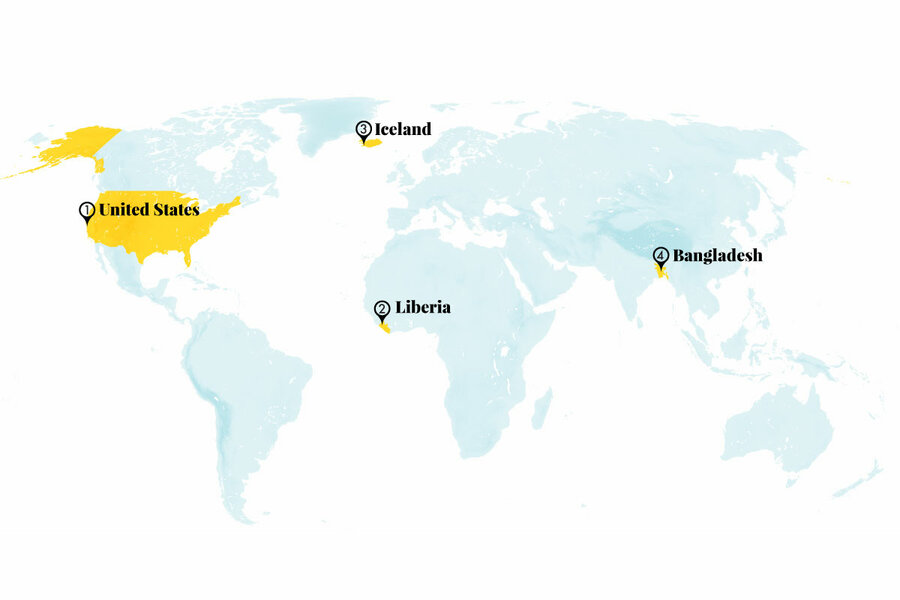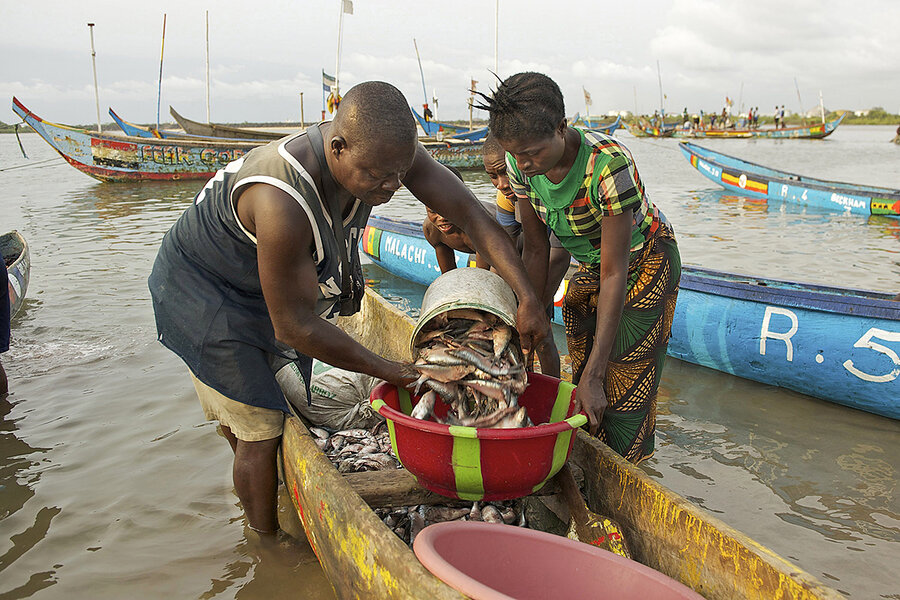Environment watch: From Indigenous lands to water recycling at the office
Loading...
1. United States
San Francisco is leading the charge in extreme water recycling. In 2015, the city mandated a decentralized approach, requiring the cleaning and reusing of water on-site for all new buildings larger than 100,000 square feet. Researchers estimate that in five to 10 years, the technology, safety testing, and regulations will come together to enable water neutrality, achieved through circular systems that repeatedly reuse a set amount of water rather than pumping water in from outside sources.
“This is the future of water,” said Newsha Ajami, director of Urban Water Policy at Stanford’s Water in the West Program. “A lot of communities are going to pick this up as a way of having economic development while having water security.”
Why We Wrote This
A story focused onIn our progress roundup, natural resource management is being distributed in ways that expand our idea of who is responsible. Around the world, more land is now owned by the people whose long histories are attached. And in San Francisco’s largest new buildings, water recycling moves in-house.
Decentralized water recycling drives down demand for potable water from centralized sites. In San Francisco, the Salesforce Tower recycles 30,000 gallons of water each day for use in irrigation and toilet flushing – a practice that saves 7.8 million gallons of water annually. In the New York borough of Brooklyn, the Domino Sugar Refinery redevelopment project will recycle 400,000 gallons of blackwater – water used in toilets, dishwashers, and kitchen sinks – each day. And a Dutch company, Hydraloop, markets a product that can recycle up to 95% of the water used in homes for nonpotable use.
Sources: Yale Environment 360, The New York Times
2. Liberia
Artisanal fishers are using an app to fight fishery degradation in Liberia. Working alongside the Environmental Justice Foundation, a British nonprofit, they are now able to document cases of illegal fishing using a mobile app called DASE. The app, which is named for the Fante word meaning “evidence,” allows users to take geotagged photos of illegal fishing activity. Fishers then submit these photos to the National Fisheries and Aquaculture Authority, which is responsible for enforcing regulations in Liberia.
West African fishing stocks have long been exploited by foreign vessels seeking to profit from the region’s rich waters. Though Liberian fishers are protected by the Inshore Exclusion Zone, an area extending 6 nautical miles from shore that only local fishers are allowed to use, inadequate enforcement means much of the coastline remains vulnerable to exploitation. Liberia relies heavily on its fisheries for food and economic development.
There have been no prosecutions yet, but local fishers say the app has helped solve some of the logistical challenges of enforcing regulations, allowing community members to feel empowered to fight illegal fishing. The app is also used in Ghana and Senegal.
Sources: Mongabay
3. Iceland
Iceland’s parliament banned conversion therapy in a unanimous vote. The legislation adds Iceland to a growing list of at least 32 countries – including Canada, Brazil, Ecuador, Spain, and Germany – that prohibit attempts to change a person’s sexual orientation, gender identity, or gender expression.
A number of organizations, such as the American Academy of Child and Adolescent Psychiatry, condemn conversion therapy as ineffective and harmful. Under the new legislation, forcing an adult to undergo conversion therapy is a crime punishable by up to three years in prison. The maximum sentence rises to five years if the victim is a child. Those who carry out conversion therapy will also face up to two years in prison.
Iceland ranks highly on Equaldex’s global LGBT Equality Index. Writer and transgender activist Ugla Stefanía Kristjönudóttir Jónsdóttir called the vote “an important reminder that progress can still be made amidst rising anti-LGBTQIA+ rhetoric and legislations.”
Sources: GCN, Attitude
4. Bangladesh
Bangladesh eliminated lymphatic filariasis, a parasitic disease. Twenty so-called neglected tropical diseases affect over 1 billion people around the world but are generally given minimal attention in global health agendas. A decade ago, half the population of Bangladesh, around 70 million people, was considered at risk of contracting lymphatic filariasis, which can leave people with long-term disability.
Thousands of community health workers across the country were trained in treatment and prevention, with support from governmental health services and international donors. “We are elated to know the people of Bangladesh are no longer at risk of contracting lymphatic filariasis,” said Tim Gabel of the research nonprofit RTI International. “Solving this health problem is an incredible achievement in improving the human condition.” Bangladesh is the 18th country to eliminate the mosquito-borne disease.
Sources: World Health Organization, RTI International
World
Land designated to or owned by Indigenous, Afro-descendant, and local communities increased by 254 million acres from 2015 to 2020 – a step forward for those around the globe working to expand Indigenous land rights. According to a report by the Rights and Resources Initiative, roughly 11% of the world’s land is now owned by Indigenous groups.
Sub-Saharan Africa, particularly Kenya and Liberia, saw the largest increase in legal recognition of Indigenous land rights. In Ethiopia, four distinct communities gained ownership of a large tract of wildlife reserve by pushing for the creation of the 486,000-acre Tama Community Conservation Area.
While the United Nations established the Declaration on the Rights of Indigenous Peoples in 2007, the measure is not legally binding in most countries. To formalize claims to traditional territory, some Indigenous groups are learning mapping technologies and using drones and camera traps. Such documentation presented to governments helps counter the pressures of development by logging and palm oil plantations from Canada to Borneo.
Studies show that land protected by Indigenous people tends to have lower rates of deforestation and forest degradation. “Indigenous Peoples’ rights and supporting Indigenous knowledge-based adaptation are critical to reducing climate change risks and effective adaptation,” said a 2022 U.N. report.
Sources: Mongabay, Rest of World, Intergovernmental Panel on Climate Change









